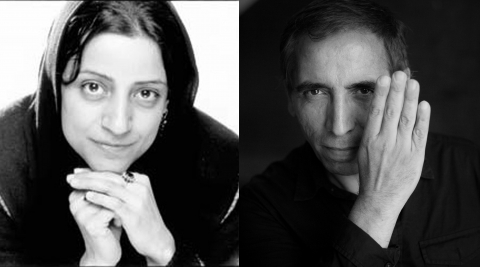
Midnight Sun Film Festival, founded and run by respected Kaurismäki filmmaking brothers in Finland is paying tribute to Makhmalbaf family's work this year.
Midnight Sun Film Festival
Finland
By: Timo Malmi
For its 34th edition,12-16 of June, MSFF is hosting Iranian directors Marziyeh Meshkiny and Mohsen Makhmalbaf for their restrospective programme.
A member of Makhmalbaf Film House, Marziyeh Meshkiny, visits MSFF with two of her magnificent works that portray her profound awareness of the position of women and children in the Middle-East. Three out of five of the filmmakers in Mahkmalbaf Film House are women, which does not necessarily comply with the general notion of the oppression of Iranian and/or Muslim women. It is compelling to hear whether the achievements of the Mahkmalbaf family’s women are exceptions, chance or a result of years of hard work by the entire family.
If a Makhmalbaf-production of five family members is exceptional, it is equally unique that both Marziyeh Meshkiny as well three children have gotten their film education in the Makhmalbaf Film School. After several years of studies and working as an assistant for her husband Mohsen Mahkmalbaf ’s film Silence (1998) and daughter Samira’s film Apple (1998), Meshkiny was ready to direct her first film.
Rarely do episode films succeed so well as a whole as Meshkiny’s debut The Day I Became a Woman (2000), set on the exotic island of Kish in the Persian Gulf; an entertaining, avant-garde story full of absurd humour about three Iranian ladies of different ages. The film was presumably banned in Iran immediately.
Meshkiny’s second work to be awarded at the Venice Film Festival was filmed in post-war Kabul in Afghanistan. Stray Dogs (2004) is a moving tale of two kids’ survival to stay alive while their mother and Taliban father are held captive elsewhere.
Few movies are more eventful and exciting than the career and life of Iranian Mohsen Makhmalbaf.
Makhmalbaf ’s varied production often coloured by humour consists of over 30 movies, including short films and documentaries.
Five of them will be seen in Sodankylä: One of the key works of Iranian cinema, comically documentary Salam Cinema (1995), A Moment of Innocence (1996), that fascinatingly touches Makhmalbaf ’s experiences of imprisonment and moves between reality and fiction in typical Iranian style, the colourfully beautiful depiction of carpet-weaving nomads, Gabbeh (1996), possibly the most famous depiction of the horror and fear of the situation in Afghanistan, Kandahar (2001), which was made there due to the high political and religious tensions in Iran, and a dictator recital made in Georgia, The President (2014). It follows up Makhmalbaf ’s persistent interest in social analyses, even though he and his movies have been blacklisted in Iran and due to his political activism he and his family have since had to live over ten years in exile in Western Europe.
We will also see Makhmalbaf as an actor, when he portrays himself in late Iranian Sodankylä visitor (2007) Abbas Kiarostami’s unusual documentary (or mockumentary) Close-Up (1990). Based on a true story, it tells a story about a poor man that is put on trial for pretending to be Makhmalbaf, and then deceiving the family of an old woman by extorting money ostensibly for acting in a movie.
Founded by the director in 1996, the film production complex Makhmalbaf Film House and it’s school are unique as the whole family, including the children, is dedicated to making movies (Samira Makhmalbaf, who got to the top at a sensationally young age, visited Sodankylä in 2009), achieving total international success. The life story of Mohsen Makhmalbaf and his family is certainly one of the most interesting ones we will ever get to hear in the morning discussions of the festival.
Source of the news: MSFF 2019

